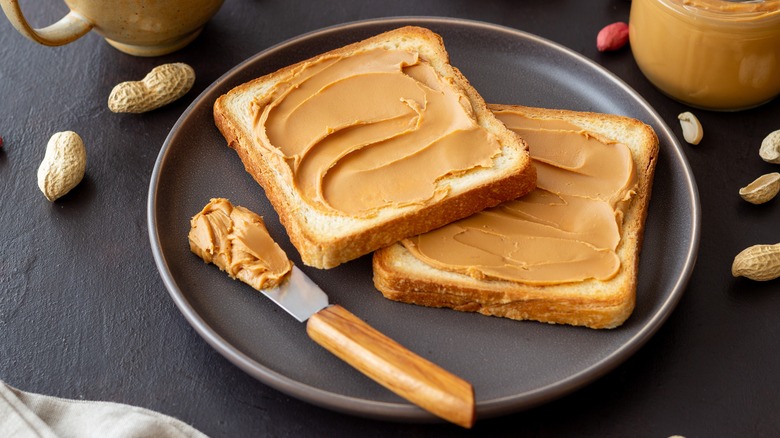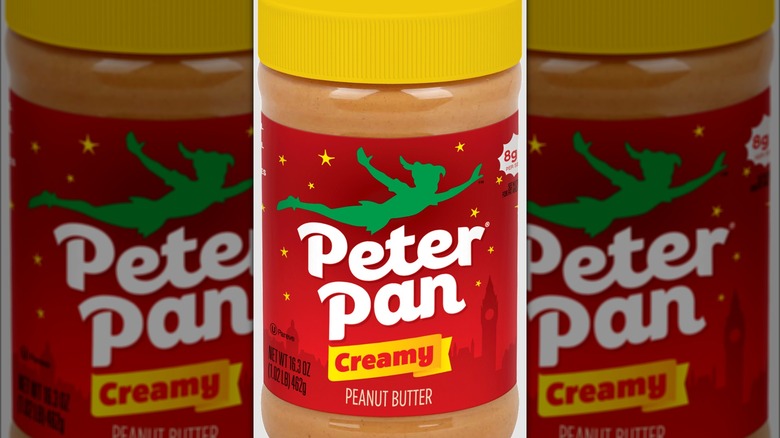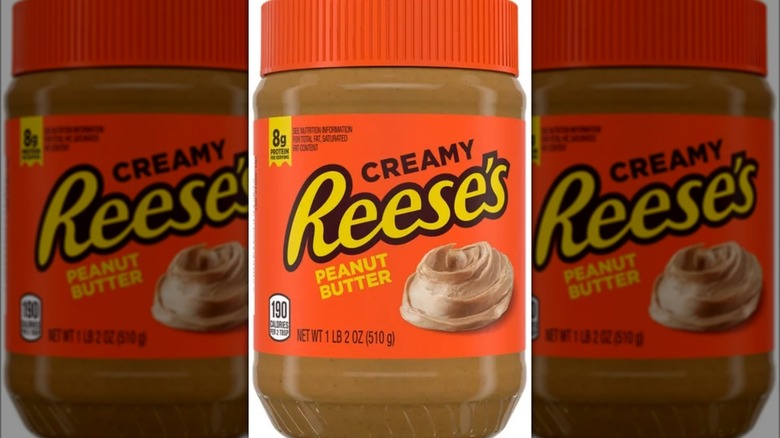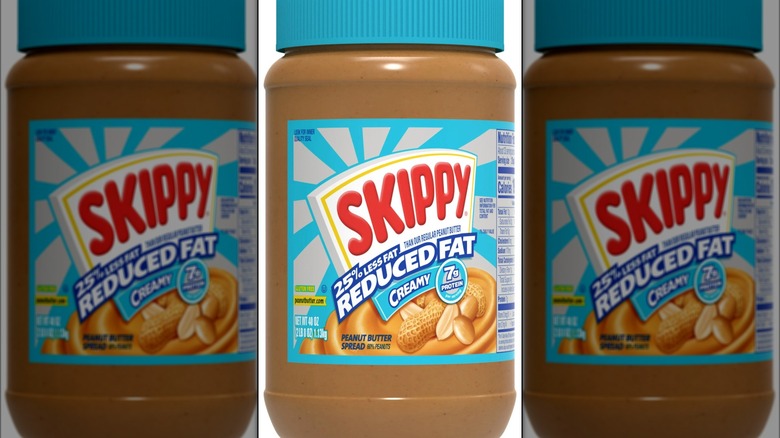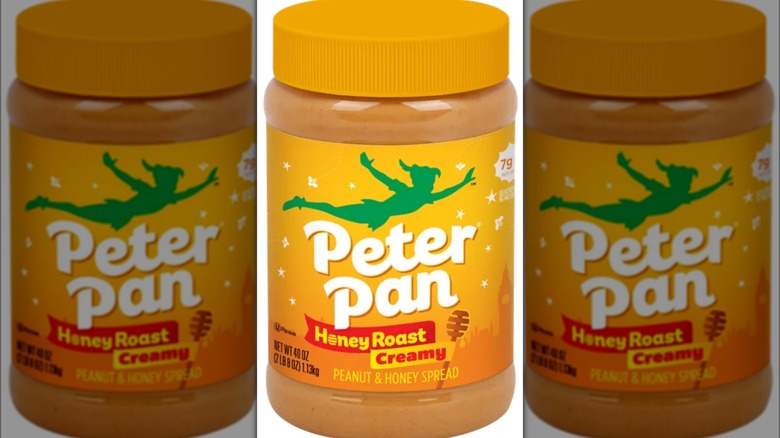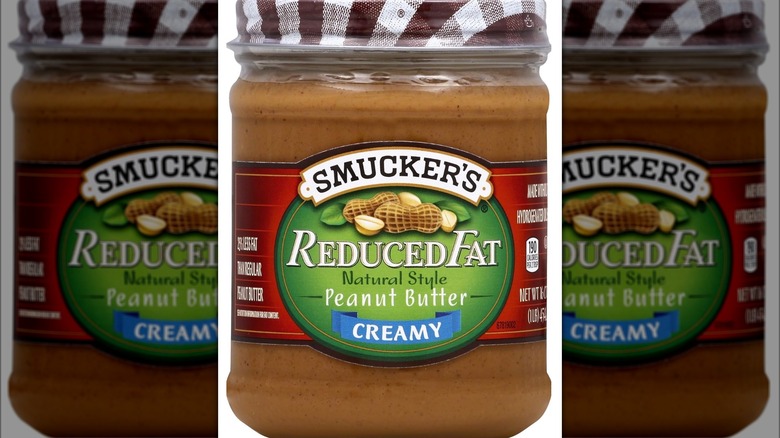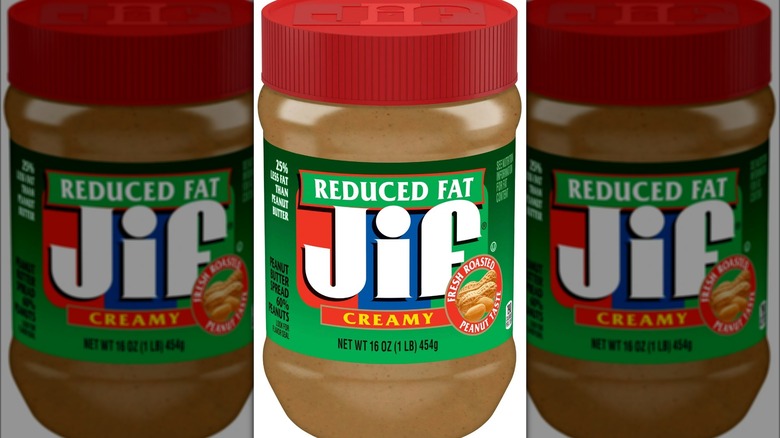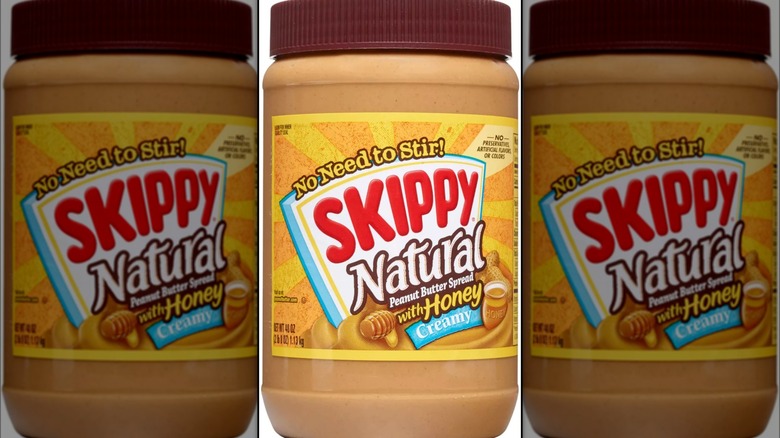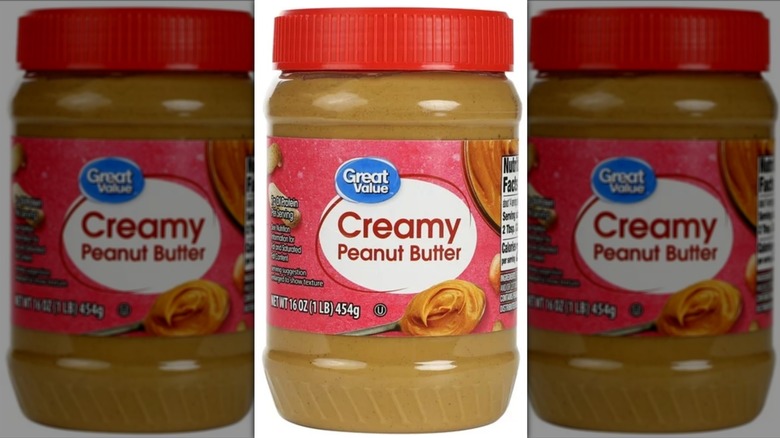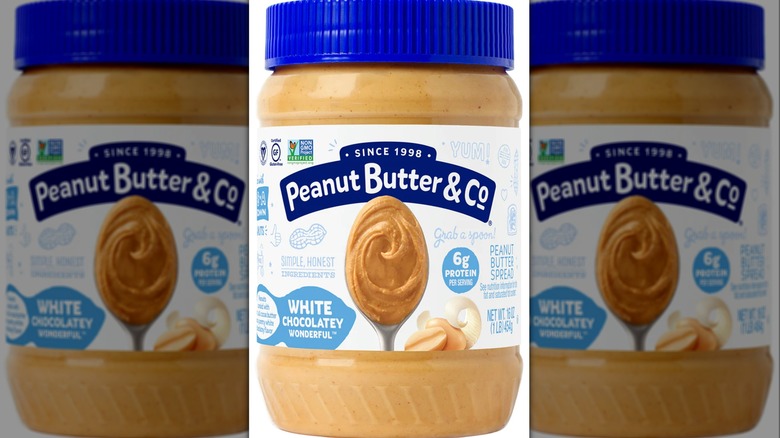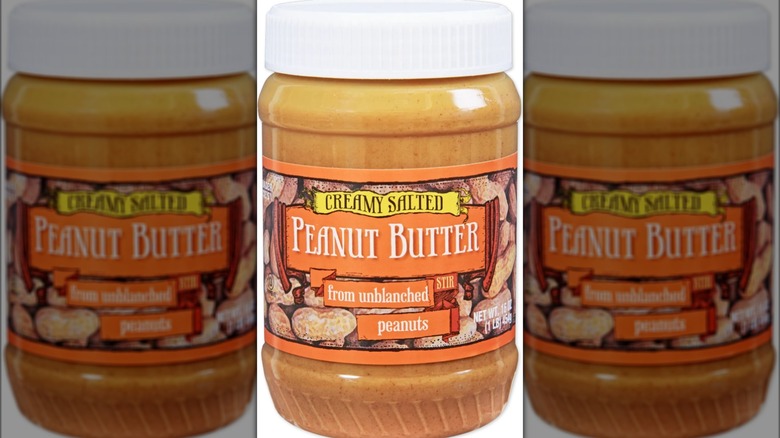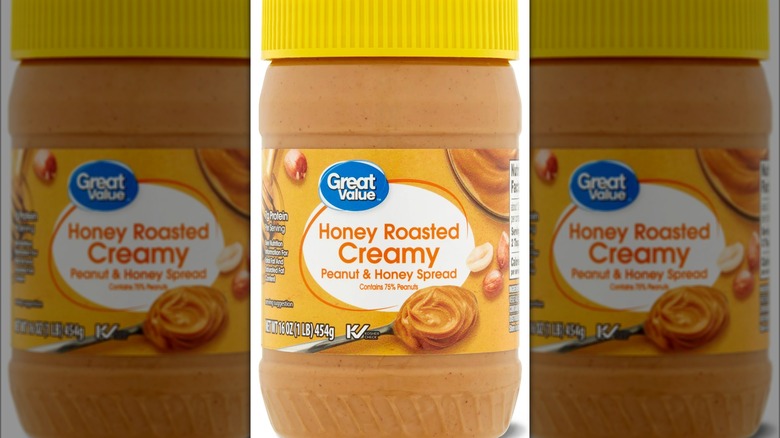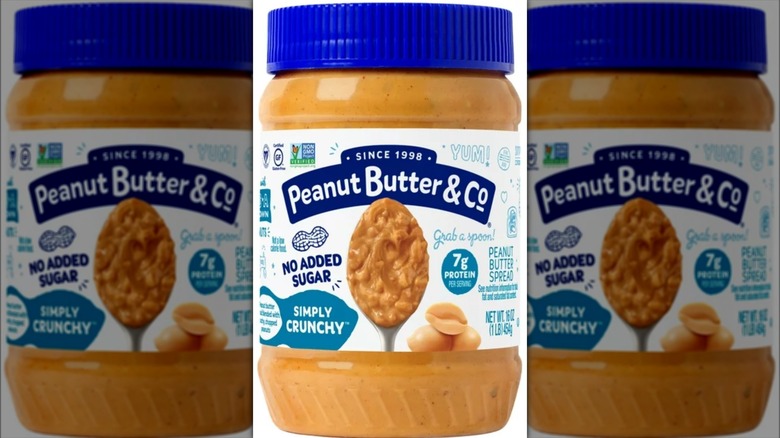12 Of The Unhealthiest Store-Bought Peanut Butters
We may receive a commission on purchases made from links.
Peanut butter is one of those foods that almost everyone seems to love. And honestly, we get it The peanut spread can slot effectively into a gigantic range of meals and recipes, and is delicious at any time of the day. Peanut butter can also be a nutritional powerhouse if you're buying the right kind. When made using primarily peanuts, peanut butter is low in sugar and carbs, and high in healthy monounsaturated fats. It's also abundant in fiber and a good source of protein, making it a filling snack or addition to recipes that also has the added advantage of being totally plant-based.
But the healthiness of your peanut butter hinges entirely on the brand you go for — and there are a lot of options to choose from. While natural peanut butter is generally relatively unprocessed, more commercially focused brands have an unfortunate tendency to pump their products full of additives that serve to improve their texture, shelf life, and taste. Unfortunately, these same additives can also make it less healthy. In this article, we sought to find store-bought peanut butter that contains notably unhealthy ingredients like corn syrup and hydrogenated oil, as well as those that contain other added sugars or additional sodium. We also included peanut butters that are curiously lacking in protein, despite being made from a protein-rich food source.
1. Peter Pan Creamy Original Peanut Butter
It's an inescapable fact that peanut butter is a high-calorie food, due to the fact that peanuts are an energy-dense ingredient. But Peter Pan Creamy Original Peanut Butter supplies way more calories than you might expect. In two tablespoons of this peanut butter, there are 200 calories, more than a lot of other market competitors, especially natural products which are just made from peanuts. While the difference in calories can be small, it's important to keep in mind, as they can add up over time.
It's also important to note that the reason why Peter Pan Creamy Original Peanut Butter is so calorific is due to its added ingredients, which aren't exactly healthy. As well as containing added sugar, this peanut butter also contains hydrogenated vegetable oil. Hydrogenated oil is added to products like peanut butter to make them last longer, and also makes it easier to spread. Unfortunately, though, hydrogenated oils also raise the saturated fat content of food items – and Peter Pan Creamy Original Peanut Butter does have a noticeably higher amount than some other peanut butter products out there. Overconsuming saturated fat can have a negative impact on your cholesterol levels (per the British Heart Foundation), so it's important to watch how much you eat.
2. Reese's Creamy Peanut Butter Spread
If you want the creamy taste of peanut butter, Reese's has you covered. As well as infusing countless sweet products with peanut butter, the candy company also puts out its own spread. Sadly, though, Reese's Creamy Peanut Butter Spread is far from a healthy option. A highly processed product, the spread contains a host of ingredients aside from peanuts, including added sugar, salt, hydrogenated vegetable oil, peanut oil, molasses, and monoglycerides. Monoglycerides are a form of fat that is added to food to boost texture and lifespan, and while they're safe, they do contain trace amounts of trans fats, and add to the overall fat content of your food.
These ingredients all add up to a picture of nutrition which isn't ideal. Most notably, Reese's Creamy Peanut Butter Spread contains a fairly high amount of sodium per serving, with 140 milligrams in every two tablespoons. Natural peanut butters made solely with peanuts, by contrast, contain no sodium at all. There are also a few grams of added sugar per serving, coming from the sugar and molasses added, and 2.5 grams of saturated fat — again more than other natural options.
3. Skippy Reduced Fat Creamy Peanut Butter Spread
Reduced-fat peanut butter feels like a good idea: As peanuts are high in fat, finding a way to reduce the content while still allowing you to enjoy the spread is something that appeals to a lot of people. However, Skippy Reduced Fat Creamy Peanut Butter Spread is not the way to go. This peanut butter does have lower fat levels than others (although, importantly, it's only a few grams less than some types of natural peanut butter), but it's still calorie-dense.
Additionally, it's crammed with additives that result in a peanut butter that's lower in fat, but full of carbs. "Often made with corn syrup solids, sugar, and other carby ingredients, many don't realize that one serving of this type of peanut butter is considered to be a full carbohydrate serving," warns registered dietitian nutritionist Lauren Manaker, per Eat This, Not That. "Tack that onto the carbs taken in with your jelly and two slices of bread, and you can be taking in way more carbohydrates than you may realize, which could result in high blood sugar or weight gain." This peanut butter also has a high level of sodium as far as peanut-based spreads go, with 170 milligrams per serving, which further adds to its unhealthiness.
4. Peter Pan Creamy Peanut Butter and Honey Spread
Peanut butter can be used in both savory and sweet recipes, but it's perhaps most commonly spread between two slices of bread, with a slick of jelly or honey. Peter Pan's Creamy Peanut Butter and Honey Spread cuts out the additional effort of finding an extra jar, by infusing honey straight into the spread itself.
However, this leaves you with peanut butter that's bursting with added sugar. Peter Pan Creamy Peanut Butter and Honey Spread has seven grams of added sugar per serving, almost a fifth of the maximum amount that men are recommended to consume daily, and over a quarter of the recommended maximum amount for women. Consuming high levels of added sugar affects your health negatively in a large number of ways, raising disease risk for multiple organs including your kidneys, liver, pancreas, and colon, and may also raise the likelihood of obesity or high blood pressure (per the American Heart Association).
This added sugar amount is of course increased even further if you're adding more honey or jelly to a sandwich made with this spread — and it increases the peanut butter's calorie count, with 200 per serving. As protein levels go, Peter Pan Creamy Honey Roast Peanut Butter Spread also has less than other peanut butter, delivering seven grams per serving.
5. Smucker's Reduced Fat Natural Style Creamy Peanut Butter
Smucker's is a big name in the peanut butter world, and like many other major producers, it offers a reduced-fat version of its spread. However, this doesn't mean its Reduced Fat Natural Style Creamy Peanut Butter is a healthier choice. "You may think choosing a reduced-fat version is always better, but don't be fooled by it. This jar contains ingredients like maltodextrin, which is often used as a substitute for sugar," warns registered dietitian nutritionist Lisa Young, via Eat This, Not That. Maltodextrin is an ultra-processed product derived from vegetable starch, and has a high glycemic index, meaning that it can cause your blood sugar to rise more than normal sugar does (per WebMD). This is troublesome for most people but is especially worrying for folks with diabetes or insulin resistance.
You should pay close attention to how this peanut butter is branded. By being called "natural style" in some retail outlets, this peanut butter can give the illusion of minimal processing and health. But while natural peanut butter is made from just peanuts, this peanut butter contains not just maltodextrin, but salt, which raises its sodium content.
6. Jif Reduced Fat Creamy Peanut Butter Spread
Reduced fat doesn't always mean healthy, folks. Jif's Reduced Fat Creamy Peanut Butter Spread promises "25% less fat than peanut butter" on the jar's label, but despite this, it's just as calorific as full-fat peanut butter options. The reason for this is because what it lacks in fat, it makes up in sugar. There are four grams of sugar per serving of this peanut butter, three of them added – and they come from not just regular sugar, but corn syrup solids, the second listed item in its ingredients.
Corn syrup solids are a hard form of corn syrup, an ultra-processed type of sugar that has some significant health effects. While regular corn syrup is potentially not as impactful as high fructose corn syrup, thanks to being made of glucose and not fructose, it can still cause your blood glucose levels to rise. If this happens repeatedly over a long period, a large number of your bodily systems can be affected negatively (via BetterHealth). It's also worth noting that while this peanut butter's fat is reduced, it also has fat added back into it, in the form of fully hydrogenated vegetable oils.
7. Skippy Natural Peanut Butter with Honey
Skippy Natural Peanut Butter with Honey seems like the best of both worlds, offering you a sweet peanut butter that eliminates the need for additional spreads while giving it to you in a natural, wholesome format. But appearances can be deceiving. This peanut butter contains a high amount of added sugars, thanks to honey and sugar being added to it, delivering five grams per serving — 10% of your daily value.
As well as this, natural peanut butter tends to get its fat content from just the peanuts used. But Skippy Natural Peanut Butter with Honey has two additional fat sources, peanut oil and palm oil. This results in a spread that has a higher saturated fat content than many other peanut butters out there, with 3.5 grams per serving. Palm oil, in particular, is added to improve the spreadability of the peanut butter, but it also adds some saturated fat. It's also worth keeping in mind that palm oil is a fairly controversial ingredient, due to its production's longstanding impact on the environment. While this is improving, more work needs to be done to ensure the sustainability of all palm oil sources.
8. Great Value Creamy Peanut Butter
Peanut butter is a reliable pantry product, and Walmart offers its own version at an affordable price. But while the Great Value Creamy Peanut Butter might be a terrific price, it's not terrifically healthy. This peanut butter has a range of added ingredients, including hydrogenated vegetable oils and salt. Both of these ingredients spike its sodium and fat levels, and two tablespoons of peanut butter will provide a high 17 grams of fat and 125 milligrams of sodium.
In addition, Great Value Creamy Peanut Butter contains, somewhat strangely, both added sugar and molasses, the super-sweet, dark syrup that provides a depth of flavor. This is odd as while you might expect these ingredients to be in peanut butter that is combined with honey or added flavors, here they add sweetness where sweetness isn't necessarily called for and also increase its added sugar content. Furthermore, there are barely any vitamins or minerals to be found in the spread. And perhaps most importantly, it has one of the highest calorie counts of any commercial peanut butter out there, with 210 calories per serving, making it an incredibly energy-dense option.
9. Peanut Butter & Co White Chocolatey Wonderful
You'd be mistaken for thinking that Peanut Butter & Co's products are somehow healthier than others. Its branding promises "simple, honest ingredients," with products made from non-GMO items. But that doesn't make its spreads nutritious. On the contrary, its White Chocolatey Wonderful flavor is actually less nutritious than a lot of other peanut butter, thanks to its lower protein level.
With six grams of protein, this spread has several grams less than most other peanut butter options. Instead, a large proportion of its 180 calories is supplied through added sugars. There are six grams of added sugar in a two-tablespoon serving, a higher amount than other peanut butters. And although it comes from cane sugar, that doesn't make it healthier. Cane sugar can affect you in exactly the same way that regular white sugar can and overconsumption of it can lead to inflammation and a host of associated health risks (via Dr. Axe). Meanwhile, the cocoa butter in the spread, which gives it its chocolatey taste, contains palmitic acid, a type of saturated fat — and contributes to the three grams you'll consume in every portion.
10. Trader Joe's Creamy Salted Peanut Butter
Trader Joe's has own-brand versions of virtually every common product, so it's not a shock that it sells its own peanut butter too. But we would be wary of assuming that it's healthy. Trader Joe's Creamy Salted Peanut Butter shows its cards in its name: This spread has a fairly high salt level, supplying 140 milligrams per portion. While this is just 6% of your daily intake, it's 6% more than a lot of other peanut butters — and small amounts can add up fast. Eating too much salt has both short and long-term effects on the body, resulting in headaches, bloating, and third in the short term (per EatingWell), and high blood pressure, kidney stones, and heart failure in the long term (via WebMD).
It's a shame that this product contains sodium because elsewhere, it looks pretty nutritious. As the only other ingredient is dry roasted peanuts, it contains no added fat or sugars, or any additives to improve shelf stability or spreadability. However, you can get many of the same qualities in peanut butter that just uses peanuts with no salt — and if you feel the urge to make it saltier, you can control the amount you put in.
11. Great Value Honey Roasted Creamy Peanut and Honey Spread
Like several other peanut butter producers, Walmart makes a combo version of its spread, mixing its peanut butter with honey. But as you can probably imagine, doing so results in a spread that's bursting with added sugars. There are seven grams of sugar in total in a two-tablespoon serving of this spread, and six of them are added. That adds up to 12% of your daily value, in a pretty small portion. And you may add to that further by smearing it onto white bread, which often has added sugar in it.
These added sugars come from three separate sources: Honey, sugar, and molasses, which come together to make a super-sweet spread. Salt is also added, presumably to balance the flavor, but as a result, you also get 115 milligrams of sodium per serving. To pile things on even further, Great Value Honey Roasted Creamy Peanut and Honey Spread also has hydrogenated vegetable oil added to it, leaving you consuming 14 grams of fat in every portion. And if that wasn't enough, it's also one of the lower-protein options out there, containing seven grams per serving, instead of the usual eight grams.
12. Peanut Butter & Co. Simply Crunchy Peanut Butter
Unlike some of the other mass-produced peanut butters out there, Peanut Butter & Co.'s offering seems to have a more wholesome touch. The company's website states that part of its mission is to produce peanut butters that avoid any "questionable ingredients." But although its Simply Crunchy Peanut Butter does only contain three things, peanuts, palm oil, and salt, it manages to be higher in saturated fat than almost any other option on the market.
This peanut butter has 3.5 grams of saturated fat per serving, a full gram more than similar offerings from companies like Walmart and Reese's. When we eat too much saturated fat, our livers aren't able to process cholesterol as effectively, and this leads to higher levels of bad LDL cholesterol in our blood, according to Heart UK. Although eating some saturated fat is totally fine (and is to be expected with a high-fat food like peanut butter), just two tablespoons of Peanut Butter & Co.'s product covers 18% of your daily value. And when other natural peanut butters out there have less saturated fat, less sodium, and no palm oil — which doesn't have the best nutritional profile itself, due to its high concentration of saturated fat and more, according to WebMD — it's difficult to see the logic in choosing this one.
